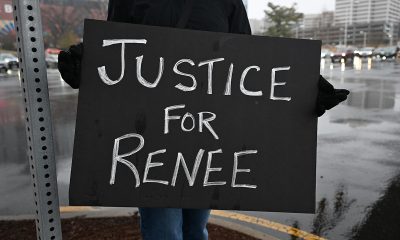National
High stakes in marriage cases awaiting Supreme Court
Legal experts weigh in on what to expect next week
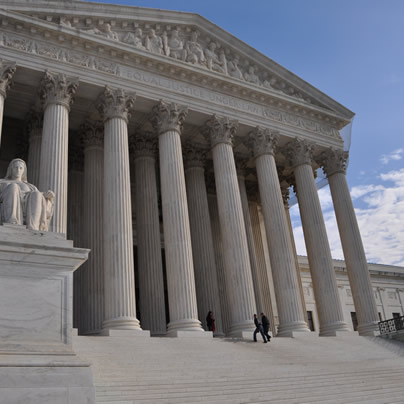
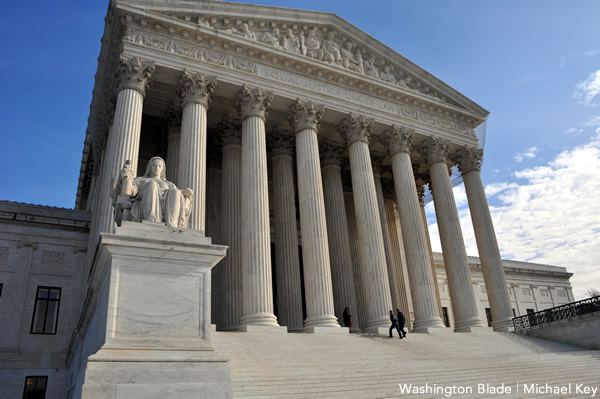
The U.S. Supreme Court could decide as soon as next week whether it’ll hear cases related to DOMA and Proposition 8. (Washington Blade file photo by Michael Key)
All eyes will be on the U.S. Supreme Court next week when it could announce whether it will take up high-profile LGBT-related cases challenging the Defense of Marriage Act and California’s Proposition 8 — and the results of those decisions could have an immediate impact on the marriage rights of same-sex couples.
On Monday, justices are scheduled to hold their first conference to decide cases they will consider when they reconvene in October following their summer recess. Among the cases docketed for this meeting is federal litigation challenging Prop 8, now known as Hollingsworth v. Perry, and one of the cases challenging Section 3 of DOMA, Windsor v. United States.
Justices can decide to take up a case, decline to hear it or put off the decision on considering the lawsuit for a future conference. It takes a vote of four justices to grant a writ of certiorari (to take up a case) but the decision will be put off if any one justice wants more time to decide.
The decision on the Prop 8 case is of particular note because if the court decides against taking up the case and lets stand an appeals court decision against the same-sex marriage ban, gay couples would once again have the right to marry in the nation’s most populous state immediately following a mandate from the U.S. Ninth Circuit of Appeals.
But if the Supreme Court decides to take up the case, the ban would remain in effect until the justices make their own ruling in the lawsuit. It’s possible the court could make a decision saying lower courts erred in overturning Prop 8. For the same-sex marriage ban to come to an end at that point, another lawsuit coming up from the district courts or repeal of Prop 8 at the ballot would be necessary.
Jennifer Pizer, legal director for the Williams Institute, said while she thinks the court is likely to take up cases related to DOMA, it’s a “much harder guess” whether justices will decide to hear the Prop 8 litigation.
“There might well be four justices that disagree with what the Ninth Circuit held, but I think it would be challenging for them probably — as it is for everybody else who’s watching the court — to wonder where a fifth vote might go,” Pizer said. “So I think it’s even odds that the court will not review in Perry.”
Jon Davidson, legal director for Lambda Legal, said in the event that the Supreme Court decides not to hear the Prop 8 case, gay couples should wait for the mandate from the Ninth Circuit before marrying in California.
“My advice to people is plan a nice wedding as opposed to running that day to go get married because there’s always some risk for couples that get married and 10 years split up, one might say, ‘You didn’t really get legally married because the injunction wasn’t in place yet and Prop 8 was still the law and they shouldn’t have married us,'” Davidson said. “Although I think that argument would lose, people don’t need to take on potentially having to fight about that later. If they just wait until the mandate, there won’t be any question.”
There could be an advantage for the LGBT community if the Supreme Court takes up the lawsuit because it could produce a ruling that would affect not only California, but all states with same-sex marriage bans throughout the country. Still, this level of examination bring a new scope of review to the Prop 8 lawsuit because the Ninth Circuit was limited in the way it restricted its reasoning to California.
Pizer said the Supreme Court could rule with a larger scope when considering the constitutionality of Prop 8, but such an evaluation would be unlikely given the limited nature of the Ninth Circuit ruling.
“I think it’s extremely unlikely that there would be a ruling either calling in question all the marriage restrictions of all the states that have them, or on the flip-side, holding that marriage absolutely as a matter of federal law must be restricted just to different-sex couples,” Pizer said. “The things that could be done on the more extreme ends of something favorable or unfavorable to same-sex couples is not so likely.”
The situation is slightly different for the DOMA lawsuits because the Windsor case is the only one that has been fully briefed and docketed for the Sept. 24 conference. The court may not issue a decision on reviewing DOMA until the full range of lawsuits challenging the anti-gay law have been scheduled for consideration.
More DOMA-related cases haven’t yet been set for consideration even though the high court has been asked to consider them. They’re the consolidated case of Gill v. Office of Personnel Management and Commonwealth of Massachusetts v. Department of Health & Human Services, the only lawsuit in which an appeals court has ruled against DOMA, as well as Golinski v. Office of Personnel Management and Pedersen v. Office of Personnel Management.
Davidson said the Supreme Court could also wait to make a decision on whether to hear the Prop 8 lawsuit until making a decision on whether to hear the DOMA cases.
“Different issues in the cases, but they might say, ‘Well, let’s think about all these at the same time to think about whether we should grant review in both kinds of cases or one, and which order,” Davidson said.
As with the Prop 8 case, if the Supreme Court decided against hearing the DOMA cases, it would have significant immediate impact. The federal government would recognize the same-sex marriages of states within the jurisdiction of the First Circuit and other challenges against DOMA would continue up the pipeline.
But the court is widely expected to decide to take up the constitutionality of DOMA because unlike Prop 8, the issue is related to federal law and the U.S. Justice Department has interceded — first in July and again this month — to ask the court to take up each of the four cases pending before the court related to the law. And a ruling from the Supreme Court would almost certainly have a nationwide scope that would enable federal recognition of same-sex marriages throughout the country as opposed to a ruling that would affect only one state.
There’s another benefit to the LGBT community if the Supreme Court were to take up the cases: the application of higher standard of review for cases related to sexual orientation. The Golinski and Pedersen cases are unique among the other DOMA lawsuits because they are the only ones in which lower courts have ruled against DOMA on the basis that they don’t meet the standards of heightened scrutiny, or the assumption they’re unconstitutional. If the Supreme Court were to consider these cases along with other DOMA cases, it could set precedent for applying heightened scrutiny to other laws in the future.
A Supreme Court ruling in favor of the anti-gay side would be significantly burdensome for supporters of same-sex marriage. That would mean opponents of the law would have to fight through the legislative process to lift the ban — a daunting task especially if Republicans were to retain control of the House.
Justices also have an opportunity in taking up the DOMA cases to assert whether the House Republican-led Bipartisan Legal Advisory Group, which took up defense of DOMA after the Obama administration declined to defend the law, has standing to defend it. Some lower courts have hinted BLAG may lack standing to defend DOMA because it’s a committee within the House that hasn’t been approved by a floor vote in either chamber of Congress.
Doug NeJaime, who’s gay and a law professor at Loyola Law School, said the role of BLAG and where the committee derives its authority presents an interesting question to the Supreme Court.
“It would be interesting to see whether the justices actually ask those threshold questions about what the status and standing of BLAG actually is,” NeJaime said. “Because both sides want a substantive determination, I think that’s partly why we haven’t seen it become a huge issue, but it is an interesting question.”
It’s unclear what the schedule will be like for the cases if the Supreme Court decides to take them up. Briefings would ensue in the months that follow and oral arguments may take place in the spring for the court to make a ruling before it adjourns in June. For the DOMA lawsuit, the Supreme Court may take up the cases, but decline to take action until more appellate courts have made decisions on the pending litigation.
Pizer said the Supreme Court may seek to hear arguments on the Prop 8 cases at the same time because they’re both related to marriage.
“The DOMA cases are quite distinct from Perry, but at the same time, they concern marriage for same-sex couples, and certainly some of the arguments made in all these cases resemble, so it wouldn’t be that surprising for the justices to decide to consider a number of them at the same time,” Pizer said.
Legal experts also say the votes of each of the justices in granting a writ of certiorari shouldn’t be an indication of how they’ll ultimately rule in each of the cases.
NeJaime said observers “can’t read too much into” the certiorari votes because justices may decide to take up the cases either because they want to uphold or strike down the laws at hand.
“I think there are clearly going to be justices, for instance, on the DOMA cases that want to take it to overturn, and will overturn DOMA, and, I think, there are justices that want to take it and would uphold DOMA, so I think it’s hard to tell, although I think the DOMA cases are the stronger cases for the LGBT side,” NeJaime said.
Other LGBT cases pending before the Supreme Court are scheduled for September conference, but they aren’t as high-profile as the marriage cases. Justices will consider whether to take up the case of Diaz v. Brewer, in which Gov. Jan Brewer (R) has appealed an injunction placed by a district court prohibiting her from enforcing a law taking away domestic partner benefits from Arizona state employees. Another pending case is National Organization for Marriage v. McKee, in which the anti-gay organization is challenging Maine disclosure laws requiring it to reveal donors regarding its involvement in the 2009 marriage ballot initiative in the state.
The White House
Trump-Vance administration ‘has dismantled’ US foreign policy infrastructure
Current White House took office on Jan. 20, 2025

Jessica Stern, the former special U.S. envoy for the promotion of LGBTQ and intersex rights, on the eve of the first anniversary of the Trump-Vance administration said its foreign policy has “hurt people” around the world.
“The changes that they are making will take a long time to overturn and recover from,” she said on Jan. 14 during a virtual press conference the Alliance for Diplomacy and Justice, a group she co-founded, co-organized.
Amnesty International USA National Director of Government Relations and Advocacy Amanda Klasing, Human Rights Watch Deputy Washington Director Nicole Widdersheim, Human Rights First President Uzra Zeya, PEN America’s Jonathan Friedman, and Center for Reproductive Rights Senior Federal Policy Council Liz McCaman Taylor also participated in the press conference.
The Trump-Vance administration took office on Jan. 20, 2025.
The White House proceeded to dismantle the U.S. Agency for International Development, which funded LGBTQ and intersex rights organizations around the world.

Secretary of State Marco Rubio last March announced the State Department would administer the 17 percent of USAID contracts that had not been cancelled. Rubio issued a waiver that allowed PEPFAR and other “life-saving humanitarian assistance” programs to continue to operate during the U.S. foreign aid freeze the White House announced shortly after it took office.
The global LGBTQ and intersex rights movement has lost more than an estimated $50 million in funding because of the cuts. The Washington Blade has previously reported PEPFAR-funded programs in Kenya and other African countries have been forced to suspend services and even shut down.
Stern noted the State Department “has dismantled key parts of foreign policy infrastructure that enabled the United States to support democracy and human rights abroad” and its Bureau of Democracy, Human Rights, and Labor “has effectively been dismantled.” She also pointed out her former position and others — the Special Representative for Racial Equity and Justice, the Ambassador-at-Large for Global Women’s Issues, and the Ambassador-at-Large for Global Criminal Justice — “have all been eliminated.”
President Donald Trump on Jan. 7 issued a memorandum that said the U.S. will withdraw from the U.N. Entity for Gender Equality and the Empowerment of Women and more than 60 other U.N. and international entities.
Rubio in a Jan. 10 Substack post said UN Women failed “to define what a woman is.”
“At a time when we desperately need to support women — all women — this is yet another example of the weaponization of transgender people by the Trump administration,” said Stern.
US ‘conducting enforced disappearances’
The Jan. 14 press conference took place a week after a U.S. Immigration and Customs Enforcement agent killed Renee Good, a 37-year-old woman who left behind her wife and three children, in Minneapolis. American forces on Jan. 3 seized now former Venezuelan President Nicolás Maduro and his wife, Cilia Flores, at their home in Caracas, the Venezuelan capital, during an overnight operation. Trump also continues to insist the U.S. needs to gain control of Greenland.

Widdersheim during the press conference noted the Trump-Vance administration last March sent 252 Venezuelans to El Salvador’s Terrorism Confinement Center, a maximum-security prison known by the Spanish acronym CECOT.
One of them, Andry Hernández Romero, is a gay asylum seeker who the White House claimed was a member of Tren de Aragua, a Venezuelan gang the Trump-Vance administration has designated as an “international terrorist organization.” Hernández upon his return to Venezuela last July said he suffered physical, sexual, and psychological abuse while at CECOT.
“In 2025 … the United States is conducting enforced disappearances,” said Widdersheim.
Zeya, who was Under Secretary of State for Civilian Security, Democracy, and Human Rights from 2021-2025, in response to the Blade’s question during the press conference said her group and other advocacy organizations have “got to keep doubling down in defense of the rule of law, to hold this administration to account.”
The White House
A full year of Trump and LGBTQ rights: all that’s been lost
White House since Inauguration Day has relentlessly attacked LGBTQ community

Uncloseted Media published this story on Jan. 20.
By NICO DiALESANDRO | One year ago today, Donald Trump was inaugurated as president of the United States for the second time. Since then, he and his administration have waged an all-out attack on the LGBTQ community by slashing crucial health and support programs, pressuring states to exclude transgender people from most aspects of life and erasing information about the community’s history. Here are all the biggest moves Trump has made against LGBTQ rights over the last 365 days.
Jan. 20, 2025 – Trump’s second first day
During his inaugural address, Trump says, “As of today, it will henceforth be the official policy of the United States government that there are only two genders: male and female.” Later that day, Trump signs “Defending Women from Gender Ideology Extremism and Restoring Biological Truth to the Federal Government,” an executive order that defines “sex” in federal law to mean biological sex at conception. It also eliminates federal recognition of trans identities, blocks gender self-identification on federal documents, ceases federal funding for gender-affirming care and restricts trans people’s access to bathrooms, prisons, shelters, and other government facilities that match their gender identity.
Trump also signs “Ending Radical and Wasteful Government DEI Programs and Preferencing,” an executive order that orders federal agencies to terminate diversity, equity and inclusion mandates, policies and programs. This order repeals a policy put in place by the Biden administration that created initiatives for the federal government to combat systemic barriers related to hiring on the basis of race, religion, income, gender identity, sexual orientation, and disability.
“We’re the party of common sense, you know, we don’t want to have men playing in women’s sports. We don’t want to have transgender operations for everyone,” Trump says at the Liberty Ball party that evening. Trump would go on to repeat the sentiment countless times throughout the year, including at press conferences with world leaders, in an interview with “60 Minutes” and even while deploying the National Guard in Washington.
Jan. 21, 2025 – The flurry of executive orders continues
Trump signs “Ending Illegal Discrimination and Restoring Merit-Based Opportunity,” another executive order that revokes a 1965 order which mandated affirmative action for federal contractors and required that they take steps to comply with nondiscrimination laws. The order violates the U.S. Supreme Court’s 2020 decision in Bostock v. Clayton County, which extended Title VII sex-based protections to trans people.
Nearly all LGBTQ- and HIV-focused content and resources are deleted from the White House’s website including the White House’s equity report, information about LGBTQ Pride Month and a fact sheet on expanding access to HIV prevention and treatment. In addition, the State Department removes its LGBTQ rights page, and the Department of Labor removes its LGBTQ workers page.
Jan. 28, 2025 – funding cuts
Trump signs “Protecting Children from Chemical and Surgical Mutilation,” an executive order that bars federal funding for gender-affirming care for minors and directs the Department of Health and Human Services to restrict insurance coverage for such treatments under Medicare, Medicaid and the Affordable Care Act. Hours after Trump signs the order, Uncloseted Media speaks with six LGBTQ kids to get their thoughts.
“For me, it’s definitely very frightening. Especially because right now I’m 16, and so, I’m going to become an adult over the course of his presidency. … And it’s really difficult, especially to plan for the future and have that lack of surety that I thought that I would,” Crow, who lives in Virginia, told Uncloseted Media.
Feb. 3, 2025
Mentions of LGBTQ people are erased or minimized across federal government websites, with a particular focus on trans and intersex people. The State Department first removes trans people in its travel safety guidelines, only mentioning the “LGB” community. As of publication, the web page has no mention of bisexual travelers either.
Feb. 5, 2025
Trump signs “Keeping Men Out of Women’s Sports,” an executive order that prohibits trans women and girls from competing on collegiate female sports teams.
Feb. 13, 2025
Under the direction of Trump’s executive order, the National Park Service removes references to trans and queer rights and history, including from the Stonewall National Monument pages. The “TQ” from “LGBTQ” is dropped in instances where the acronym is present. Protesters gather at the Stonewall National Monument in New York the next day to voice their outrage.
In an interview with Uncloseted Media, Stacy Lentz, co-owner of the Stonewall Inn, calls the removal a blatant attempt to rewrite history and exclude the very people who led the fight for equality.
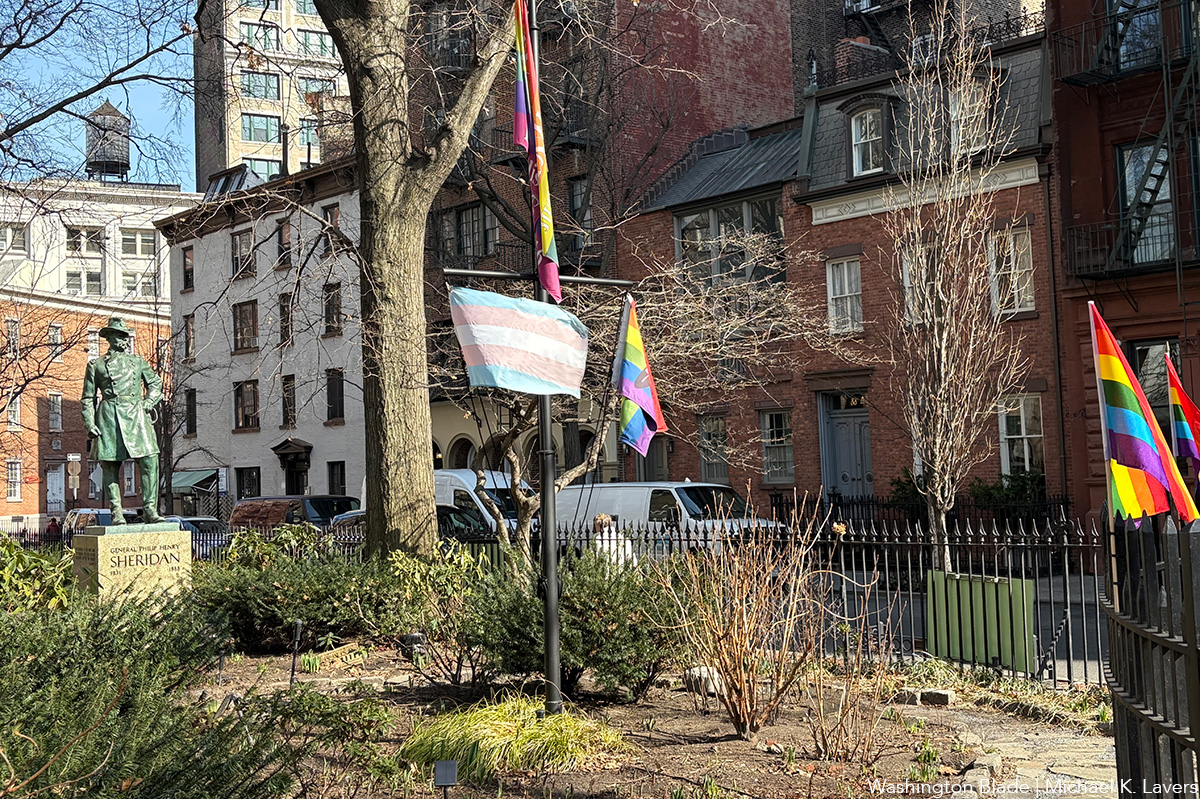
Feb. 14, 2025
The U.S. withdraws from the United Nations LGBTI Core Group, which formed in 2008 and pledges to support LGBTQ and intersex rights by “work[ing] within the United Nations framework on ensuring universal respect for the human rights and fundamental freedoms for all, specifically lesbian, gay bisexual, transgender and intersex (LGBTI) persons, with a particular focus on protection from violence and discrimination.”
March 15, 2025 – illegal deportations
The Trump-Vance administration deports 238 Venezuelan migrants to CECOT, a maximum-security prison in El Salvador. The administration claims these individuals are affiliated with the Tren de Aragua gang. Andry Hernández Romero, a gay makeup artist seeking asylum, is one of the migrants with no criminal record. Hernández vanished from U.S. custody before his asylum hearing, and his lawyer asserts he was deported without due process.

On July 18, Hernández is returned to Venezuela along with 249 other migrants. The Department of Homeland Security dismisses abuse allegations of torture, sexual assault and other inhumane treatment.
April 2, 2025
U.S. Citizenship and Immigration Services updates its policy to recognize only two biological sexes, male and female, for immigration benefit requests and official documentation. This policy shift reverses previous efforts to accommodate nonbinary and trans individuals, as it removes the “X” gender marker option from immigration forms.
“By denying trans people the right to self-select their gender, the government is making it harder for them to exist safely and with dignity. This is not about ‘common sense’ — it is about erasing an entire community from the legal landscape,” says Bridget Crawford, director of law and policy at Immigration Equality.
April 3, 2025
In his first few months in office, Trump and his administration cancel over 270 National Institutes of Health grants focused on LGBTQ health, totaling at least $125 million in unspent funds. The cancellations disrupt research on HIV testing and prevention, AIDS, cancer, mental health and more.
The cuts scrap more than $800 million worth of research into the health of LGBTQ people. The cuts abandon studies of cancers and viruses and set back efforts to defeat a resurgence of sexually transmitted infections. They also eliminate swaths of medical research on diseases that disproportionately afflict LGBTQ people, including HIV/AIDs, various sexually transmitted infections and cancers.
June 2, 2025
Stanford begins suspending gender-affirming care for people younger than 19 in response to Trump’s executive order. Other major health networks and many regional centers across the country begin following suit.
Children’s Hospital Los Angeles announces they will be cutting off care for patients as old as 25 beginning in July, stating that they were left with “no viable alternative” because they could not risk any cuts to their federal funding.
June 6, 2025
Trump’s military ban begins, disallowing trans people from serving in all branches of the armed forces and removing those currently in the service. Those who do not identify themselves will have their medical records surveyed and be involuntarily separated if it is discovered that they are trans.
July 1, 2025
Trump’s “Big Beautiful Bill” is passed by Congress. The sweeping package of tax breaks that largely benefit the wealthy include major funding cuts to LGBTQ health care as well as a number of support programs that disproportionately serve queer people.
July 17, 2025
The Trump-Vance administration officially shuts down the LGBTQ-specific option on the 988 youth suicide hotline. This comes a year after data finds that 41 percent of LGBTQ youth seriously considered suicide. Notably, there are no plans to shut down the other targeted hotline options. Arden, who called when they were 16, told Uncloseted Media, “If it weren’t for the hotline, I would have killed myself.”
Aug. 4, 2025
U.S. Immigration and Customs Enforcement arrests 40-year-old asylum seeker Rickardo Anthony Kelly during a routine immigration appointment. Kelly, who survived being shot 10 times in Jamaica by attackers who targeted him for being gay, is released two weeks later and describes the conditions of the ICE facility as “unconscionable,” “inhumane,” and “horrific.”
Aug. 12, 2025
The State Department releases a revised 2024 human rights report that omits references to LGBTQ people and erases mentions of discrimination based on sexual orientation or gender identity. The report also removes critiques of governments for mistreating LGBTQ communities.
It excludes information about Hungary’s anti-LGBTQ laws that encourage citizens to report their LGBTQ neighbors and that ban depictions of homosexuality or gender transition in schools or the media.
Aug. 15, 2025
The Trump-Vance administration announces plans to eliminate gender-affirming care from the Federal Employees Health Benefits Program starting in 2026. The policy would also block access to hormones and surgeries for federal workers and their families.
Aug. 20, 2025
The media reports on court filings that reveal that the Justice Department issued subpoenas to hospitals for private medical records of LGBTQ patients 18 and younger. The DOJ requests billing data, communication with drug manufacturers, Social Security numbers and recordings from providers who treat gender nonconforming minors. Doctors across the country report threats and fear government retaliation.
“The subpoena is a breathtakingly invasive government overreach. … It’s specifically and strategically designed to intimidate health care providers and health care institutions into abandoning their patients,” says Jennifer L. Levi, senior director of transgender and queer rights at GLAD law, an LGBTQ legal group and civil rights organization.
Sept. 4, 2025
In response to a mass shooting in Minneapolis that was carried out by a trans woman, CNN reports that the DOJ is considering restricting trans Americans’ Second Amendment rights. The department aims to justify a firearm ban by declaring trans people mentally “defective,” building off of Trump’s trans military ban. The proposal sparks backlash from the National Rifle Association, who says in a statement that they will not “support … gun bans that arbitrarily strip law-abiding citizens of their Second Amendment rights.”
Sept. 12, 2025
The DOJ removes a study from its website showing that far-right extremists have killed more Americans than any other domestic terrorist group. The archived report disappears two days after anti-LGBTQ conservative activist Charlie Kirk is assassinated.
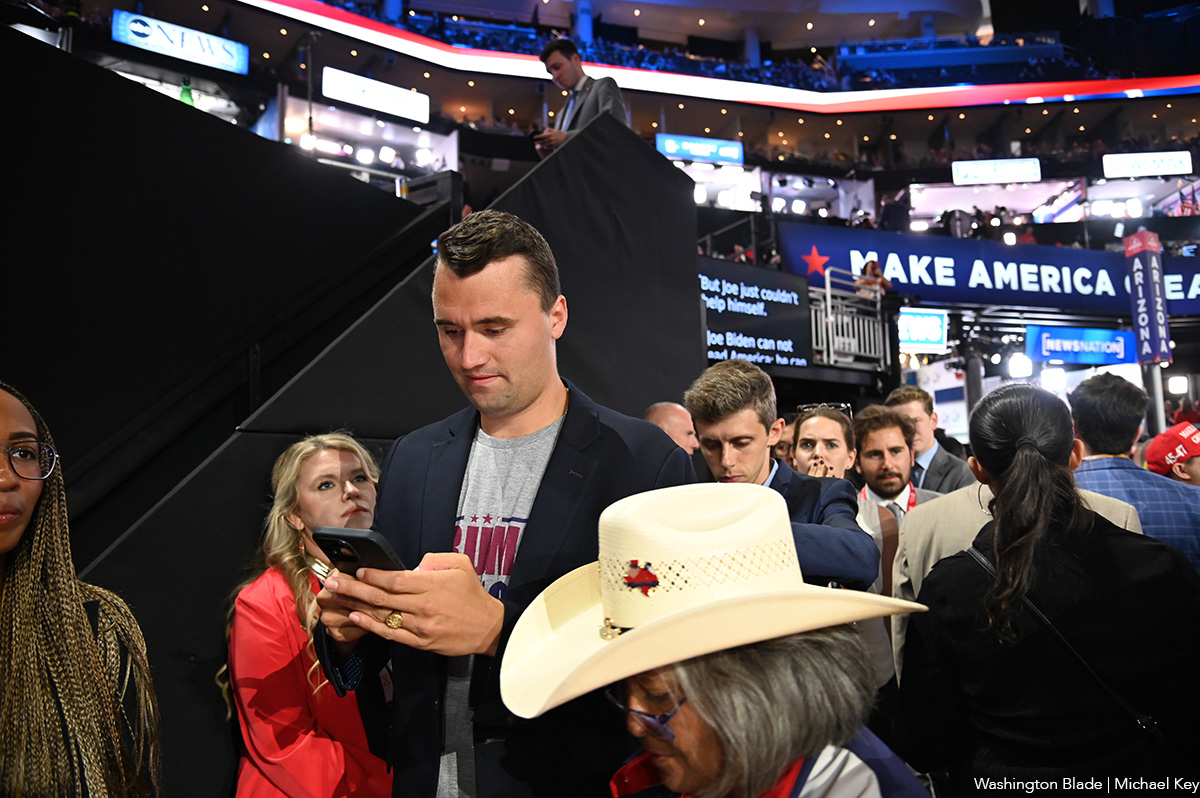
Sept. 22, 2025
White House Press Secretary Karoline Leavitt claims the administration is investigating why trans people are turning to “domestic terrorism,” despite no evidence of this. She calls anyone denying the false link “willfully ignorant,” despite the most recent data available from 2018 showing that trans people are four times more likely to be victims of violent crime when compared to cisgender people.
Sept. 23, 2025
Trump cancels a budget meeting and blames a potential government shutdown on Democrats’ support for trans-inclusive policies.
Oct. 1, 2025
FBI Director Kash Patel fires a trainee for displaying a Pride flag on his desk, labeling it an improper “political” message. The dismissal follows reports that pro-Trump appointees are combing internal FBI files to identify LGBTQ employees.
Oct. 3, 2025
Education Secretary Linda McMahon sends a nine-page proposal to nine universities that asks for a commitment to ban trans-inclusive facilities, define sex by “reproductive function” and limit race, gender or identity factors in admissions. The proposal calls for schools to revise their governance structures by “abolishing institutional units that purposefully punish, belittle, and even spark violence against conservative ideas.”
Oct. 10, 2025
The White House lays off more than 1,100 HHS employees. The Office of Population Affairs, which administered Title X family-planning networks, teen pregnancy prevention and LGBTQ health initiatives, is eliminated.
Nov. 6, 2025
The Supreme Court grants the Trump-Vance administration’s request to put a hold on federal rulings in Massachusetts, affecting trans and nonbinary people by preventing them from self-identifying correctly on their IDs, claiming to be in line with Trump’s “Defending Women from Gender Ideology Extremism and Restoring Biological Truth to the Federal Government” executive order. In her dissent, Justice Ketanji Brown Jackson writes, “This court has once again paved the way for the immediate infliction of injury without adequate (or, really, any) justification. Because I cannot acquiesce to this pointless but painful perversion of our equitable discretion, I respectfully dissent.”
Dec. 4, 2025
According to a memo obtained by NPR, the DOJ instructs inspectors to stop evaluating prisons and jails using standards designed to protect trans, intersex, and gender nonconforming people from sexual violence. This is in direct violation of the Prison Rape Elimination Act.
Dec. 18, 2025
HHS Secretary Robert F. Kennedy Jr. and Mehmet Oz, who leads Medicaid and Medicare, announce that HHS is heavily restricting trans health care; prohibiting Medicaid reimbursement for gender-affirming care for people under 18; and blocking all Medicare and Medicaid funding for hospitals that provide the care to minors.
Jan. 1, 2026
The Office of Personnel Management institutes policy changes that exclude coverage for “chemical and surgical” gender-affirming care in the FEHB and Postal Service Health Benefits plans for 2026, with narrow exceptions.
Jan. 7, 2026
Renee Good is shot and killed by ICE agent Jonathan Ross in Minneapolis. Good leaves behind a wife, Becca, and three children. In a statement, Becca remembers her wife:
“Renee lived by an overarching belief: there is kindness in the world and we need to do everything we can to find it where it resides and nurture it where it needs to grow. Renee was a Christian who knew that all religions teach the same essential truth: we are here to love each other, care for each other, and keep each other safe and whole.”

Days later, Trump tells reporters, “At a very minimum, that woman was very, very disrespectful to law enforcement. … It was highly disrespectful of law enforcement. The woman and her friend were highly disrespectful of law enforcement.”
Additional reporting by Hope Pisoni. Washington Blade photos by Michael Key and Michael K. Lavers.
Florida
DNC slams White House for slashing Fla. AIDS funding
State will have to cut medications for more than 16,000 people

The Trump-Vance administration and congressional Republicans’ “Big Beautiful Bill” could strip more than 10,000 Floridians of life-saving HIV medication.
The Florida Department of Health announced there would be large cuts to the AIDS Drug Assistance Program in the Sunshine State. The program switched from covering those making up to 400 percent of the Federal Poverty Level, which was anyone making $62,600 or less, in 2025, to only covering those making up to 130 percent of the FPL, or $20,345 a year in 2026.
Cuts to the AIDS Drug Assistance Program, which provides medication to low-income people living with HIV/AIDS, will prevent a dramatic $120 million funding shortfall as a result of the Big Beautiful Bill according to the Florida Department of Health.
The International Association of Providers of AIDS Care and Florida Surgeon General Joseph Ladapo warned that the situation could easily become a “crisis” without changing the current funding setup.
“It is a serious issue,” Ladapo told the Tampa Bay Times. “It’s a really, really serious issue.”
The Florida Department of Health currently has a “UPDATES TO ADAP” warning on the state’s AIDS Drug Assistance Program webpage, recommending Floridians who once relied on tax credits and subsidies to pay for their costly HIV/AIDS medication to find other avenues to get the crucial medications — including through linking addresses of Florida Association of Community Health Centers and listing Florida Non-Profit HIV/AIDS Organizations rather than have the government pay for it.
HIV disproportionately impacts low income people, people of color, and LGBTQ people
The Tampa Bay Times first published this story on Thursday, which began gaining attention in the Sunshine State, eventually leading the Democratic Party to, once again, condemn the Big Beautiful Bill pushed by congressional republicans.
“Cruelty is a feature and not a bug of the Trump administration. In the latest attack on the LGBTQ+ community, Donald Trump and Florida Republicans are ripping away life-saving HIV medication from over 10,000 Floridians because they refuse to extend enhanced ACA tax credits,” Democratic National Committee spokesperson Albert Fujii told the Washington Blade. “While Donald Trump and his allies continue to make clear that they don’t give a damn about millions of Americans and our community, Democrats will keep fighting to protect health care for LGBTQ+ Americans across the country.”
More than 4.7 million people in Florida receive health insurance through the federal marketplace, according to KKF, an independent source for health policy research and polling. That is the largest amount of people in any state to be receiving federal health care — despite it only being the third most populous state.
Florida also has one of the largest shares of people who use the AIDS Drug Assistance Program who are on the federal marketplace: about 31 percent as of 2023, according to the Tampa Bay Times.
“I can’t understand why there’s been no transparency,” David Poole also told the Times, who oversaw Florida’s AIDS program from 1993 to 2005. “There is something seriously wrong.”
The National Alliance of State and Territorial AIDS Directors estimates that more than 16,000 people will lose coverage
-

 Colombia5 days ago
Colombia5 days agoGay Venezuelan opposition leader: Country’s future uncertain after Maduro ouster
-

 Maryland5 days ago
Maryland5 days agoLayoffs and confusion at Pride Center of Maryland after federal grants cut, reinstated
-

 Opinions5 days ago
Opinions5 days agoDo not forget that Renee Good was queer
-

 Florida5 days ago
Florida5 days agoDNC slams White House for slashing Fla. AIDS funding
















